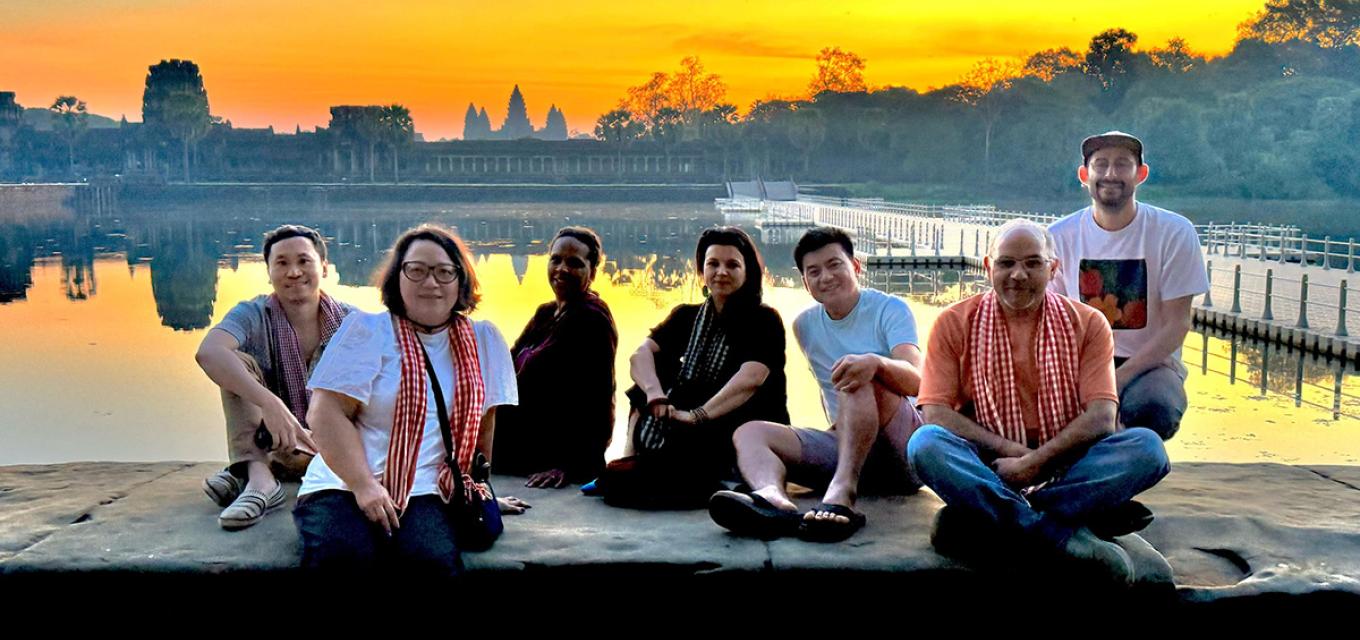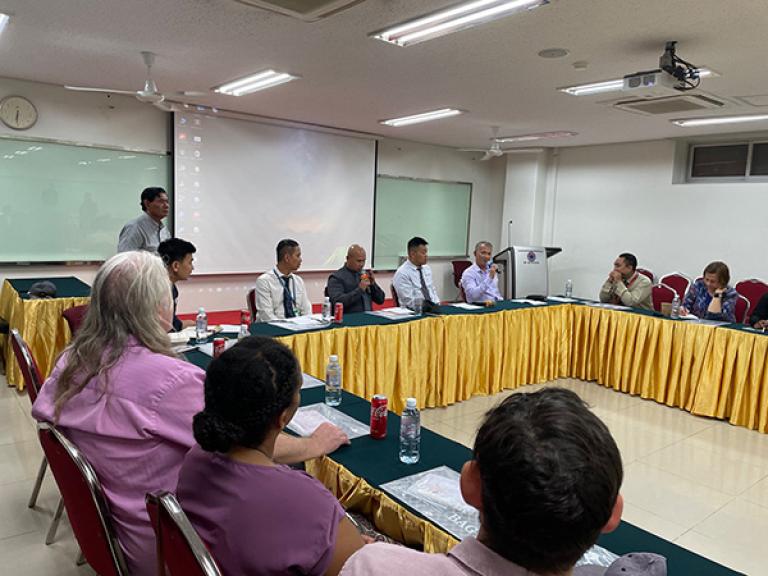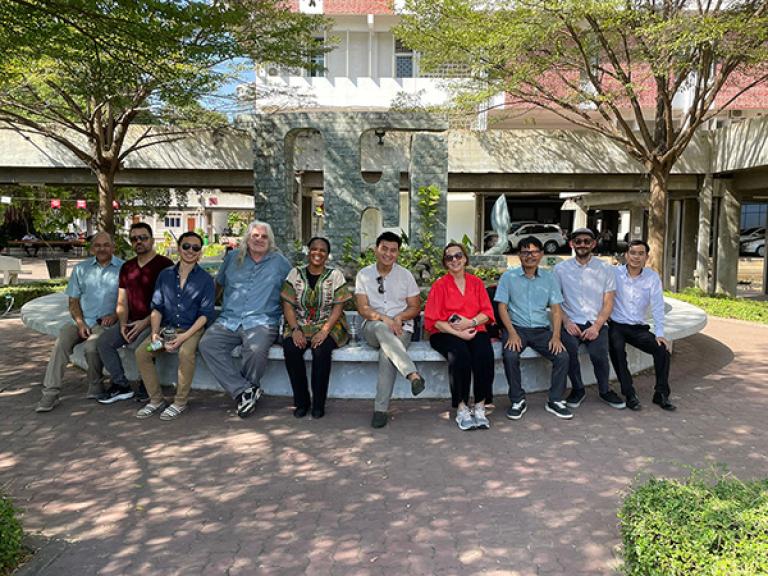2024 Spring / Summer

Reflecting on Cambodia
CEHD FACULTY DELEGATION ENGAGES WITH EDUCATIONAL PARTNERS IN SOUTHEAST ASIAN NATION
In January 2024, nine CEHD faculty traveled to Southeast Asia to learn and engage with partners in the Kingdom of Cambodia. International faculty delegations are part of recent efforts by the Office of International Initiatives to promote cultural understanding, interdisciplinary collaborations, and global perspectives among CEHD faculty. The first sponsored faculty delegation to Brazil in September 2018 was recognized by the University of Minnesota with the C. Eugene Allen Award for Innovative International Initiatives. “The vision is for a diverse group of individuals from across our college to meaningfully engage in knowledge exchange and consider ways to integrate diversity and internationalization into their research and teaching,” says Marina Aleixo, director of the Office for International Initiatives.
The CEHD delegates to Cambodia included Aleixo, Vichet Chhuon from the Department of Curriculum and Instruction (C&I), David DeLiema from the Department of Educational Psychology, Ka I Ip from the Institute of Child Development (ICD), Timothy Lensmire from C&I, Roozbeh Shirazi from the Department of Organizational Leadership, Policy, and Development (OLPD), Catherine Solheim from the Department of Family Social Science, Bhaskar Upadhyay from OLPD, and Sheila Williams Ridge from ICD.
The delegation to Cambodia is grounded in a “glocal” approach to international engagement, a concept that was first adopted by the business and technology sectors to understand how global issues impact local markets. In higher education, glocal has been adopted to describe the understanding that internationalization efforts must include a respectful exchange with local communities. To be glocal is to be in constant dialogue. Just as things that occur globally affect local communities, local life reflects diverse cultures and experiences from around the world. Hence, being glocal obligates researchers, teachers, and students to consider actions that will demonstrate respect and mutuality among those they work with domestically and abroad.

The delegation met with a number of CEHD partners in Cambodia, including the Khmer Vulnerability Aid Organization (KVAO). KVAO is a non-governmental organization that works with Cambodian Americans who have been deported to Cambodia. They help individuals integrate into Cambodian society through temporary housing, legal documentation, and employment assistance. Since 2018, Chhuon and Aleixo have worked with KVAO to create a teaching series that supports deportees with pedagogical training and employment as English teachers.
DeLiema says of the visit, “We shared our noticings about the poise and affirmed identities of the English-language teachers we met, who are recent deportees to Cambodia, and who all participated in the UMN-led teacher education workshops. We discussed a renewed sense of human resilience and a deeper sense of who is given opportunities to be resilient.”
Delegates also visited Tiny Toones, a school founded by a deported Cambodian American, and has opened its doors to Cambodian street children since 2005. Its focus is on the whole child, including students’ passion for the arts. Tiny Toones has helped hundreds of children receive schooling on its campus and elsewhere and in some cases, students developed into returning teachers and well-known dancers and artists. Tiny Toones is currently an internship site for CEHD graduate students in Cambodia.

Another highlight was the faculty visit to the Royal University of Phnom Penh, which is Cambodia’s largest and oldest institution of higher education. This university represents the nation’s rebuilding efforts after the devastating war and genocide that occurred in Cambodia from 1975 through 1979. The visit was also meaningful given that many CEHD alumni attended Royal University of Phnom Penh prior to their matriculation in CEHD.
Shirazi says, “One common thread was the enormity of labor of re-envisioning and rebuilding educational structures and practices in Cambodia in the wake of a genocide that targeted Cambodian educators and intelligentsia. This rebuilding is not only long-term cognitive and material labor, but deeply emotional as well—I was struck by how proximate the past was to the educators we met, by the ways their stories were narrating a collective memory in real time.”
Williams Ridge is director of the Child Development Lab School and says, “My experience was supported by talented educators from many different backgrounds in Cambodia, including the teachers who were deported from the U.S., those working at universities, those with little formal education, and others with extensive formal education. Learning more about the genocide in Cambodia was also very meaningful in the contexts of education, injustice, and resiliency. Thinking about my work in leading the Child Development Lab School and teaching in the Institute of Child Development, these experiences inform the ways that I more broadly talk about education, educators, and the communities of learning that we create.”
The issue of trauma and family separation as related to war and state policy was a recurring theme throughout the visit. For example, the family of Ka I Ip, assistant professor in ICD, was directly impacted by the Cambodian civil war and genocide. On this trip, Ip met many Cambodian Americans deported by the U.S. and observed that “the trauma of separation extends beyond the immediate family, impacting broader social networks and community cohesion. Thus, the practice of deportation without considering its profound consequences on families and communities perpetuates cycles of intergenerational trauma and hinders opportunities for resilience and healing.”
Chhuon, the delegation’s faculty lead, says, “These colleagues represent the very best of our college in terms of diverse interests, intellectual curiosity, and embodiment of the spirit of collaboration.” CEHD continues to support multiple projects in Cambodia related to areas of immigration policy, refugee experiences, teacher training, entrepreneurship, and mental health.
—VICHET CHHUON
Read more reflections about the visit: z.umn.edu/Cambodia_delegation
Photo credit(s): Photos courtesy of International Initiatives